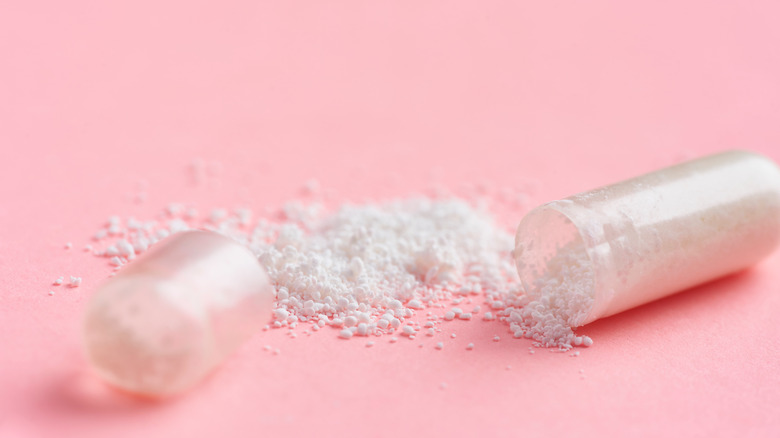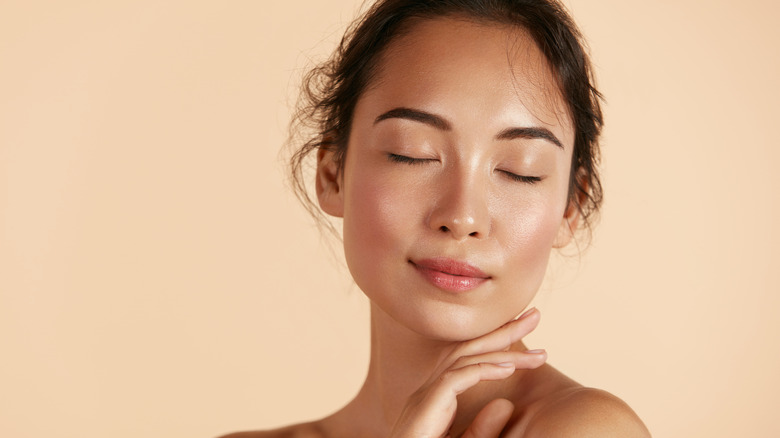How To Use Prebiotics For Your Skincare
Let's get real for a second, bacteria tend to get a bad rep. But the truth is that when it comes to balancing the microorganisms that live on your skin, prebiotics could be the answer. Independent reported that while the link between gut health and skincare hasn't been a big beauty trend until recently, the microbiome movement is rising up and is one of the beauty industry's newest trends.
MBG Lifestyle reported that the microbiome is, in essence, an ecosystem of bacteria that lives on the skin — it might sound a little icky, but without these essential good bacteria, our skin would fail to function. Independent explained that this bacteria helps the skin to remain healthy, aiding various aspects of skincare, from how easily products are absorbed to the wellbeing and appearance of skin, in addition to helping manage a range of skin concerns.
The idea of using prebiotics for skincare might seem strange, but there's a lot of science behind the new craze.
How has biotic skincare become so popular?
What has made biotic skincare a big thing in 2021? MBG Lifestyle reported that the emergence of this craze hasn't happened overnight. Instead, it has unfolded alongside a range of skincare research about the impact of the microbiome on overall physical health, as well as immunity and the function of the skin as a barrier. Independent reported that there are now a number of beauty products that have been designed with prebiotics incorporated, allowing us to better manage the balance of microorganisms on our skin. Simply by maintaining the right amount of good skin bacteria, you can ensure a happy and healthy microbiome.
As per Today, Keri Glassman, celebrity nutritionist, explained that, "Much like the gut, your skin has its own microbiome that helps shield you from harm, and there are a lot of similar microorganisms that can be found in the gut and on the skin's surface." To keep both your gut and your skin healthy, probiotics and prebiotics are needed in combination.
Elina Fedotova, a cosmetic chemist, explained that, "Probiotics are live microorganisms that are beneficial to your health, topically or internally. Prebiotics are the food source that help to keep your probiotics alive and active." Think of it like this — a prebiotic acts as a kind of food for probiotics and helps to boost the growth of good microorganisms in the gut and on the skin.
How can you use prebiotics to boost your skin health?
What are the benefits of choosing to add prebiotics and probiotics to your skincare and what's the best method to go about doing so? According to Today, there are a number of benefits of using probiotics in skincare, both when used topically and when taken orally.
Dr. Suzanne Saffie-Siebert, the CEO of Good Science Beauty, explained that prebiotics can help to protect skin health, explaining that, "A combination of prebiotics and probiotics in skincare can be outstanding for improving skin's surface protection, ensuring skin has what it needs to keep its barrier intact, smooth and healthy." Saffie-Siebert also explained that when the microbiome of your skin is balanced, it can assist in offsetting negative implications that can cause dryness, redness, and a weakened skin surface.
As per MBG Lifestyle, it's important to be aware that different strains of prebiotics offer different functions. Often, it's algae, minerals, and plant sugars that have the biggest impact and are the most common prebiotic ingredients. When choosing prebiotic laced products, look for prebiotics such as Xylitol, Rhamnose, Glucomannan, and Fructooligosaccharides.


